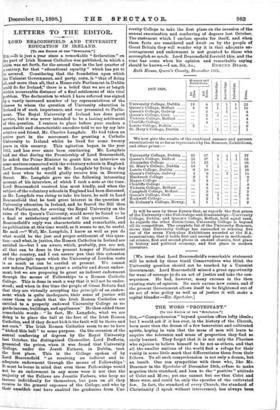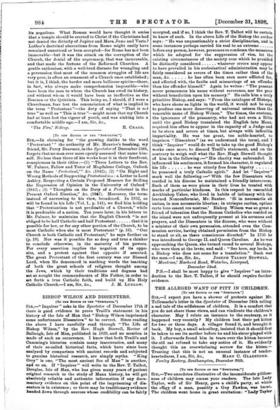THE WORD "PROTESTANT." fro THE EDITOR OF THE "13PECT•TOR.1 Comprehension"
beyond question offers lofty ideals ; but I would ask if it has ever, in the history of the Church, been more than the dream of a few benevolent and cultivated spirits, hoping in vain that the mass of men will learn to acquire the tolerance and sense of proportion they find so easily learned. They forget that it is not only the Pharisee who rejoices to believe himself to be not as others, and that all the smaller nations of the world find a refuge for their vanity in some little mark that differentiates them from their fellows. To all such comprehension is not only a dream, but an insult. One can sympathise with those who, like Mr. Dearmer in the Spectator of December 24th, refuse to make negation their standard, and lean to the " positive " attitude of Colet and More ; yet one cannot but see that Colet and More were, and could be, only the apostles of the cultivated few. In fact, the standard of every Church, the standard of Christianity (I speak without irreverence), has always been
its negations. What Roman would have thought it amiss that a temple should be erected to Christ if the Christians bad not denied the divinity of Jupiter and Mars, Juno and Vesta ? Luther's doctrinal aberrations from Rome might easily have remained unnoticed or been accepted—for Rome has not been immovable—but it was the attack on the corruption of the Church, the denial of the supremacy, that was inexcusable, and that made the fortune of the Reformed Churches. A gentle enthusiast, with a well-bred distaste for wrangling and a persuasion that most of the common struggles of life are very poor, is often an ornament of a Church once established ; but it is, I think, the harder and more bellicose spirits—those, in fact, who always make comprehension impossible—who have been the men to whom the Church has owed its history, and without whom it would have been as ineffective as the Essenes or the Quietists. This being so, I should, if I were a Churchman, fear lest the renunciation of what is implied in the term "Protestant"—the dray of saying "That is not true" as well as "This is true "—might mean that my Church had at least lost the vigour of youth, and was sinking into a comfortable middle age.—I am, Sir, &c.,
The Firs,' Sidcup. E. CRABS.



































 Previous page
Previous page